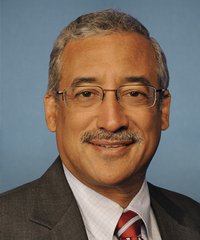
Congressman Robert C. "Bobby" Scott has represented Virginia’s third congressional district in the U.S. House of Representatives since 1993. Prior to his service in Congress, he served in the Virginia House of Delegates from 1978 to 1983 and in the Senate of Virginia from 1983 to 1993.
During his tenure in the Virginia General Assembly, Congressman Scott successfully sponsored laws critical to Virginians in education, employment, health care, social services, economic development, crime prevention and consumer protection. His legislative successes in the state legislature included laws that increased Virginia’s minimum wage, created the Governor’s Employment and Training Council and improved health care benefits for women, infants and children.
We all know that the current economic climate has taken a toll on many families across the nation and that the economy has been slow to recover from the deep recession. Congressman Scott believes the best long-term way we can create jobs and get people back to work is investing in education and training, beginning with early education and continuing through college or vocational education, as well as adult education and training. A well-educated workforce is more important today than ever before. With the rapid development of this global marketplace, the United States is no longer the single dominant country in the world and American's competitive advantage is a well educated workforce.
Large and targeted investments in workforce development are long overdue and it is time that they are addressed in Washington. Congress recently seized upon the opportunity to do this through reuathoization of the Workforce Investment Act (WIA), which expired in 2003. WIA is the main federal legislation that coordinates federal workforce development programs. Congressman Scott supported the reauthorization of WIA through the Workforce Innovation and Opportunity Act, which included an enhanced definition of “individuals with barriers to employment” that explicitly includes older workers over the age of 55 as well the long-term unemployed. This explicit inclusion means that state and local workforce plans must include goals and strategies for serving these and other disenfranchised groups. Additionally, the new law requires that 75% of youth funding in the bill support out-of-school youth, sometimes referred to as "opportunity youth" for the opportunites they represent for their communities. When kids drop out of school they are much more likely to get into trouble and commit crimes. And once a juvenile falls off of the right track, he or she will face a range of problems and taxpayers will be on the hook for the cost of incarcerating these individuals. By investing in opportunity youth, Congressman Scott believes that we are investing money on the front end so we don't end up footing the bill later on.
Many believe that during these tough fiscal times we cannot afford to invest in job creation. But Congressman Scott believes that the choice is clear - we must invest in education and job training so that we have a strong workforce and strong nation for future generations. We can choose to put funding towards direct job creation programs, such as transportation and infrastructure projects. This will help accelerate our recovery, putting millions back to work, and gradually return our budget to balance over the next decade, all without jeopardizing Social Security or Medicare or other important social safety net programs. As Chairman of the Committee on Education and Labor, Congressman Scott is the lead sponsor in the House of Representatives of the Raise the Wage Act, which would gradually raise the minimum wage to $15 by 2024. This bill would be good for workers, business and the economy.